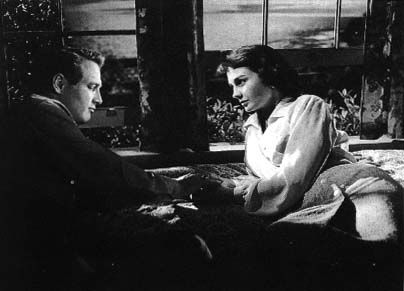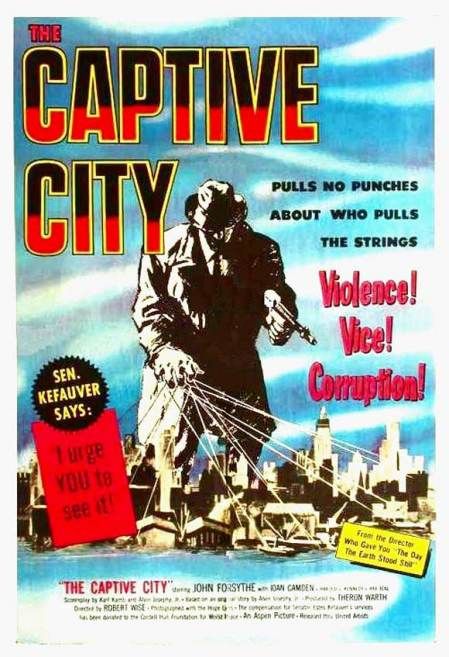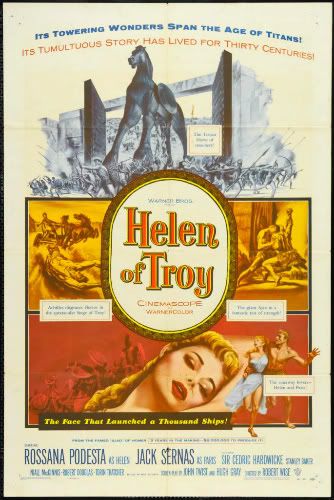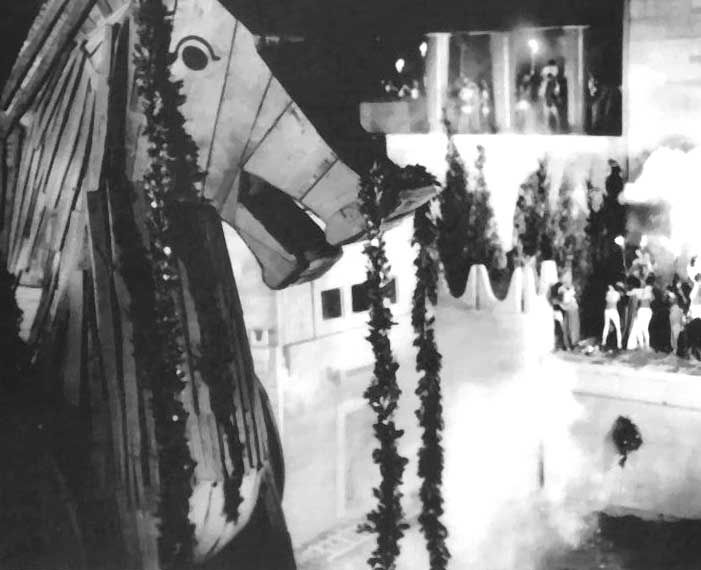I enjoy Robert Wise's understated, thoroughly professional way of storytelling and the incredible range of films he made during his career. I often feel as though I've only recently discovered something new from Wise. I caught the end of Run Silent, Run Deep last time it was on, and really thought that the Gable-Lancaster tension was interesting. I'll try to see the entire movie this time out.

Until They Sail (1957) is also showing on June 29th. A war story from the POV of four sisters in Christchurch, New Zealand, it gave Jean Simmons, Joan Fontaine, Sandra Dee and Piper Laurie chances to shine a light on the impact of war on the emotional lives of women in wartime. The exceptionally good acting by the four leads kept this from degenerating into a soap opera. Wise had a gift for transforming less than perfect material into a memorable--and tasteful story--and though had his share of clinkers, when he found himself making films that were compromised for budgetary reasons he still did what he could to make a decent movie. Wise had wanted to make Until They Sail in New Zealand and in color, but he and cinematographer Joseph Ruttenberg did a great job, despite the black and white and studio-bound sets by emphasizing the strengths that the actresses brought to the story. It wasn't a perfect movie and I'm not crazy about Paul Newman's self-absorbed acting at this stage of his career, but the interesting blend of intelligence and beauty that Jean Simmons had in spades makes up for a lot.

One film I'd really recommend is The Captive City (1952), a rarely screened film that recently showed up on Netflix streaming online, though it does not appear to be available on DVD. Here's the gist of what I wrote about The Captive City a few years ago here on the SSO:
It is an excellent Robert Wise film shot in a noirish documentary style. The director, intentionally echoing the Kefauver hearings of the time, and the McCarthy era paranoia so well reflected in Wise's previous film, The Day the Earth Stood Still, works well with with cinematographer Lee Garmes in this movie. Garmes was using an innovative Hoge lens to photograph the movie,and they create a stark style that helped to make this movie very striking visually and psychologically. The lens, which allowed for extremely detailed closeups and a stark black and white beauty to many scenes on the street and in the cramped offices and homes of the film's settings, was developed by Ralph Hoge, who had worked as a key grip on Citizen Kane and as an assistant to Wise on this picture. This lens allowed an incredibly detailed depth of field, (going beyond even what Gregg Toland had achieved), and allowing more setups in more actual locations and realistic settings.
Though shot on location in the larger Reno, Nevada, the filmmakers create a real feeling of small town life in this movie, its coziness, its comfortable shabbiness, as well as its claustrophobia. In terms of the acting, watch for a few brief, but powerful scenes with Marjorie Crosland as a small town mobster's ex-wife. She is a wonderful actress, investing a small character with a lifetime of realism. I also liked Ian Wolfe's turn as a minister. The events depicted in this movie were based on the real life experiences of Time magazine reporter Alvin Josephy, Jr. when he returned from WWII and was working for a chain of weekly newspapers near Hollywood, where mob figures threatened his boss for investigating local bookies. (Josephy also wrote an excellent autobiography "A Walk Toward Oregon: A Memoir" about his lifelong interest in a variety of topics, including crime, American Indian history, and his adventures as a screenwriter in Hollywood, along with other topics).
One Robert Wise movie that surprised me as a spectacle if not as a human drama was Helen of Troy (1956), which was shown recently on TCM.In Robert Wise on His Films by Sergio Leemann, the director said that "[t]he movie didn't cause any attention here [in the U.S.], but I remember getting a review from England that called it 'the sleeper of the year.' I was very proud of it, especially for its documentary-like visual texture." I thought that it must have influenced Don Siegel quite a bit when he came to make the much better known The Invasion of the Body Snatchers too.
Here's a terrific rundown of some of the publicity attempted by Aspen Pictures which was an indie production company formed by Wise, Mark Robson and former RKO producer Theron Warth in 1949. I believe it was this production company that Val Lewton had hoped to be a part of before he became ill, (and was reportedly shut out by his creative partners). Aspen pictures was not ultimately successful.

It was also one movie that Robert Wise told interviewers later that he wished he'd never said yes to, and one type that he never wanted to make again--though he did seem kind of "epicish" in some later movies, like The Hindenburg, (a guilty pleasure movie that I've always enjoyed). Helen of Troy was a total unknown to me, coming along at a time when movies with the likes of Steve Reeves (Hercules Unchained) and Kirk Douglas (Ulysses) were packing 'em in at the drive-in with the "sex-sword-and-sandal" series of movies. I have found one very informative site that describes the background on this quasi-disaster (everybody needs failures) but I still wonder what kind of bet Wise lost that got him assigned to this movie, but I guess he did what he could with the movie.
Taking elements from the Iliad and the Odyssey, Wise got stuck with two underwhelming actors in the leads as Paris (Jacques Sernas, who looked like Alan Ladd's anemic European cousin) and Helen (Rossana Podesta, with the most unnatural and stiffest platinum blonde wigs I've seen since the last half hour of Mr. Skeffington), and it didn't even help to have a very young, kittenish, brunette Brigitte Bardot in a small part as a servant of Helen. Fortunately, the movie had the excellent Niall McGinniss along as Menelaus, as well as Cedric Hardwicke (as Priam with a rotten looking beard), Torin Thatcher (Ulysses), Harry Andrews (Hector), and Stanley "I'm always p.o.ed" Baker (as Achilles). Wise did a good job showing the spectacle involved (the arrival of the Trojan fleet was pretty impressive as they filled the harbor of Sparta), but the love story stuff was awful. Every time the mythic qualities of the story began to gain momentum, the movie would cut back to the lovers pledging their troth to each other. (I was really glad that Menelaus caught up with them and took revenge, since that meant there would be no more mooning about their "great love" for one another).
My Favorite Character: Cassandra as played by Janette Scott (Day of the Triffids, Crack in the World)
Every time this kid shows up she's told to shut up by her family as she tells them just what they don't want to hear! I half-expected her brothers to complain "She is such a whiner" and "what a bummer" whenever she showed up. Scott actually did a good job of conveying the burden that the teenage Cassandra felt--even she wished she didn't foresee such negative events. She wished she could be like everyone else, but no--the gods had to make her a seer.
My Favorite Scene: The Trojan Horse Arrives and Cedric Hardwicke decides to throw a party

Here's the trailer for Helen of Troy (1956):
[youtube][/youtube]
One factoid I have gleaned from Robert Ryan's biography by Franklin Jarlett: When Robert Wise went to Europe in '53 to make this epic, he was pretty amused to discover that one of his greatest "failures" from a typical Hollywood viewpoint, The Set-Up (1949) was playing to packed houses and the press only wanted to ask him about it. Wise's friend Billy Wilder told the puzzled American director that if The Set-Up had been made in Europe and imported to the U.S., it would have been hailed as a masterpiece and run for a year in the art houses.
